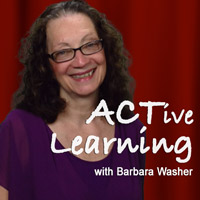| 6 , 7 , 8 | |
| Theater | Science English |
| Grade Level Program | Integration |
| 5 | 60 min |
|
Three-Five, 60-90 minute sessions with a grade level Sharing during Session 5, if desired Sessions typically held once or twice a week to best integrate with selected Language Arts unit Number of sessions and schedule determined during the pre-planning meeting and based on the needs of the school |
|
| In-School Short Term Residency | |
| All year | In-School, |
| $10 | 0 |
| yes | In-Person |
|
Props, handouts, prompts or reference materials based on selected unit or topic |
|
|
Chart paper or white board Paper (lined and non-lined) or a journal for each student Agreed upon materials or copies Copy of selected Language Arts unit or chapter and related text for the planning meeting |
|
|
Open space in classroom or multi-purpose space large enough for entire class to participate on their feet simultaneously or spread out to work in small groups Access to tables/desks/chairs for writing or drawing activities An accessible outdoor space near the building for sensory exploration A large space or auditorium reserved for Session 4 and Session 5, if sharing with the whole grade level |
|
|
I can demonstrate focus, concentration and sensory awareness by using two or more of my 5 senses to fully explore an environment or object. I can use sensory recall and appropriate grade-level vocabulary to vividly describe a sensory experience by speaking, writing or drawing/labeling and share my observations with a partner. I can use precise words, phrases and sensory language to add at least 3 relevant details describing a location, character, experience or event in a written narrative or poem or add at least 3 concrete details or examples to improve accuracy in a written report or informational text. |
|
|
Communication is Key! In Vivid Vocab, teachers may select any Language Arts unit or project and if desired, a related text. Collaboration with the Teaching Artist ensures the alignment of art form and content to fully support student learning. (See Additional Notes for examples) Improvisational theatre activities enable students to harness the power of words to successfully meet the constant challenge to "add more detail" to their writing. The residency typically consists of 5 sessions with possible teacher directed classwork in between. Each meeting incorporates a warm-up, a brief review, 1-2 drama activities, moments of self-reflection, a summary, and a preview. Session 1 builds comfort and confidence for participating in Drama, as students focus attention in their own personal space, turning off their "autopilot" and actively tuning in to their surroundings. Sessions 2 and 3 offer a sequence of theatre exercises that boost concentration, heighten sensory awareness, expand sensory recall, and stimulate imagination/creativity. Working with partners or in small groups, students sharpen observation and recall skills as they re-sense and describe their experiences by writing, drawing, or speaking. Session 4 guides students to incorporate their observations into a poem, story, or descriptive paragraph; or to select relevant facts and concrete details for an essay, historical narrative, or scientific report. Session 5 empowers students to share a portion of their work with peers, reflect on their own efforts and give/receive feedback to solidify their learning. The program provides a balance of ease and challenge, choice and structure, movement and table work, individual exploration and group collaboration; ideal for equipping middle school students with the necessary tools to effectively discover and describe the world around them. *Feedback shows that "students take personal pride in their original work" and even those who "never talk in class" are willing to share. |
|
|
Example: Students writing novels for NaNoWriMo Young Writers Program directly applied the techniques to enhancing descriptions of locations in their work. Create a project that best supports the curriculum and your students or select one of the previously designed units shown below: Writing and illustrating original Haikus Analyzing imagery and details in poetry Writing and presenting reports for a school Science Fair Sample exercises and activities: A. For building Sensory Awareness -Through a Windowpane, Listening to the Environment, Identifying an Object, or Blind-folded Trust Walk B. For developing Sense Memory or Recall - See a Sport, Name the Food, or What am I Listening to? Tips from Reader"s Theatre and Public Speaking are incorporated to help students prepare to share a portion of their work with the class or the entire grade. *All ACTive Learning Through Drama programs have been developed and implemented by a professional Theatre Educator in collaboration with Classroom Teachers and Arts Specialists. |
|
|
1-3 are welcome to assist in the classroom, if the teacher desires. Parents, guardians and administrators could watch the informal Share in Session 5. |
|
Grade 6 |
||||
|
||||
Grade 7 |
||||
|
||||
Grade 8 |
||||
|

